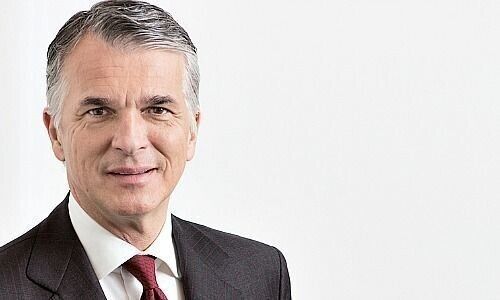There are seven important questions facing UBS ahead of its annual results. The integration of Credit Suisse, sustained success in Wealth Management, and a possible step up the career ladder for Iqbal Khan are key among them, finews.com maintains.
1. Profit or loss?
Switzerland's largest bank posted a loss of 785 million US dollars in the third quarter, the first three-month period including Credit Suisse. That was the point where it became more than clear that integrating the rescued bank would entail very significant costs for the buyer.
Even in isolation of those costs, profitability had been pointing down. The bank reported $1.1 billion in profit in the second quarter and $844 million in the third while bank management expects the fourth quarter figures to be in the black. The consensus for earnings is an adjusted annual pre-tax profit of $3.965 billion.
But that would only be half the story of what the bank managed to do on its own steam. The earnings trend will also be an important indicator as to whether the decision by the government and supervisors was the right one when it came to saving what was once Switzerland's second-largest bank. The fact that the bank run on Credit Suisse was stopped in March 2023 had a great deal to do with the confidence the market had in the buyer at the time.
But now, integrating Credit Suisse can't be seen to be destabilizing UBS in any way.
2. Have the Job Cuts Started?
As previously announced, the new UBS wants to save $10 billion by 2026. Personnel is by far the bank's highest expense. In the third quarter, the number of staff at the combined bank fell by 13,000 full-time jobs when compared with the end of 2022.
In the media, the total number of cuts seen as necessary was believed to be around the 35,000 mark. There were estimates that 12,000 jobs needed to go in Switzerland alone related to the takeover. Management itself has announced 3,000 redundancies to this point.
This week, straight talk is expected after Credit Suisse's Swiss business was fully integrated in August.
3. Who do the remaining senior managers get now?

(Image: UBS)
The eternal merry-go-round discussion surrounding compensation is expected to gather steam in the context of thousands of imminent job cuts. The enormous technical accounting profits resulting from the takeover of Credit Suisse could prompt dramatic increases in pay for CEO Sergio Ermotti (image above) and those around him. At the same time, UBS also made retention payments for staff it wanted to keep at Credit Suisse, as research by finews.com indicates.
The total personal expense number will provide a view of the level of compensation for the remaining employees of the new UBS even though the bank no longer discloses incentive-based accruals.
Banker compensation is likely to remain in sharp focus given the Federal Council, the executive branch of the Swiss government, wants to embed the public liquidity backstop, a key part of the rescue plan, in law.
4. Is everything on track?
The milestones related to Credit Suisse have been ticking over like clockwork. But the time of quick wins is over, something that was made vividly clear by the full integration in August of the rescued bank's Swiss business. Now, there is only the hard grind of integration left. This year, Credit Suisse clients in the core businesses will be transferred to the UBS platform. From an IT perspective, that is something that has never been done on that scale and it entails any number of risks.
Merging a large number of legal entities is something else that should not be underestimated, internal sources at UBS indicate. To wit, it was only at the end of 2023 that the parent units of both institutes were combined. That could prompt a chain reaction, and increase the danger of further delays.
5. Can the bank get rid of legacy assets quickly enough?
The bank is also expected to revise its three-year targets on Tuesday (February 6). Many want a great deal more than just a normal adjustment of financial targets such as the targeted end-2026 return on equity of 15 percent. A good amount of attention is focused on the legacy assets and liabilities on the balance sheet that the combined entity has to rid itself of.
The quicker those risks are taken off the book, the more space the future UBS-Credit Suisse has related to capital and future growth plans. At the end of November, the bank said by 2026 only half of the remaining $30 billion in risk-weighted assets (RWA) would remain and management will be measured by the progress on that.
6. How did Iqbal Khan do?

(Image: UBS)
UBS's core global wealth management business is where the greatest promise of the Credit Suisse rescue lies. Becoming a wealth management powerhouse. But the way to world dominance has an obstacle in the way - Wall Street's Morgan Stanley. It dominates the US market, the world's largest. Given that, it has to try and play catch up overseas, as the American business has been plagued by high costs and limited client scope for a long time.
It is up to GWM head Iqbal Khan (image above) to untie the Gordian knot while he continues to watch over the rest of the world. However, another key strategic region, Asia, isn't on a sure footing given the prevailing economic uncertainties there. But Khan has to deliver as that is the only way he can continue to remain the bank's crown prince and succeed CEO Ermotti.
7. What do shareholders get from it?
UBS's share price has risen almost 45 percent since the forced rescue of Credit Suisse was announced. But more gains are reasonable, the analysts at the Zurich Cantonal Bank say. According to them, the significant potential of the integration is not yet reflected in the share price. UBS shares are currently in the second part of a three-phase uptrend.
The first was when the bank bought Credit Suisse at a sharp discount. The second is the hard work of integration and the third will be bearing the fruits from that.
That is something that Swedish financial investor Cevian has been betting on after it became a new major shareholder in UBS at the end of 2023. They believe the share price could increase another 50 percent in a relatively short time. But there are others out there concerned about the sheer size of the combined UBS-Credit Suisse entity and that is something that could continue to pull major shareholders in different directions.




































